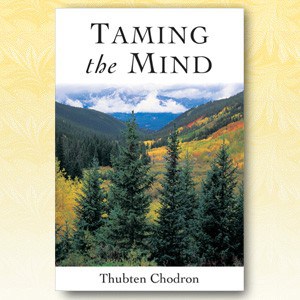Freedoms and fortunes of this life
Stages of the Path#14 Precious Human Life Part 2
We’re on the second verse:
Realizing how this body of freedoms and fortunes is found but once, is difficult to obtain and is easily lost, inspire us to partake of its essence, make it worthwhile and not be distracted by the meaningless affairs of this life.
I won’t go through all the freedoms and fortunes this time. You can look them up in a book, but I think the main thing when you’re contemplating them is to really put yourself in that other situation and see if it would be easy or difficult to practice the Dharma. For example, in the list of freedoms, freedom from rebirth as a hell being, as a hungry ghost, as an animal, as a perceptionless God and so on. It’s quite interesting in a meditation session to pretend you had an animal rebirth and how would you be able to practice the Dharma. You might say, “Well, what are you talking about? I can’t be reborn as an animal. How can I do this meditation?” When we were children, we pretended to be animals, didn’t we, lots of times in our plays, our skits, our childish things. We were always pretending to be animals. We have that ability in our play.
Just imagine thinking like one of the kitties—because kitties think don’t, they? I mean they have likes and dislikes you see, giving their opinion right now. You think if my mind were like that, and that was the field of what I thought about and the field of what I had experienced, would it be possible to practice the Dharma? You really put your mind in that situation and really pretend that that’s all that your mind thought about, that’s all your mind could think about. It’s very frightening when you do that, which is what makes us appreciate having a human rebirth so much as we see, “Wow, my mind’s not stuck like that.”
Or if you’re thinking about having impaired faculties, imagine having some kind of brain defect or emotional defect, emotional problem that was so severe that it really affected your cognitive abilities and your ability to discern things, your ability to learn. Would you be able to practice?
Really imagine that, and then come back to where you are now. It feels like such a relief like, “Whoa, am I fortunate.” Then think, “But I don’t know what kind of karma I’ve created because death comes quickly and by tomorrow, if I die, and that kind of karma ripens, I could be actually one of those kinds of beings. What happens then? What happens then? It’s not like it’s going to be me with all my sophisticated language and conceptual abilities, but in an animal body. That’s not what it’s going to be like. It’s going to be a whole different way of thinking and an inability to learn complex conceptions and to think about the Dharma. What to do then?”
If you have a hard time with that, then just know how it is like when you’re really exhausted and you can’t think straight, where your mind is really out of your control, and you cannot get it to think in a clear way. Or like when you have a fever and you’re really sick and just think of that time. That pulls you out of the idea of thinking, “It’s just going to be me in another body.” You realize, “No it’s not. And once I’ve left this body, it’s for good, and I’m in that body. Then what happens then? At the time of death, of let’s say that animal life, what’s the chance of me thinking about the Dharma having some kind of good karma ripen?”
Then you get really concerned and you also value every single second that you have as a human being. When you value every single second because you see it’s not going to happen, it’s not going to last forever. You easily could be in another rebirth, then you don’t waste time doing stupid things like gossiping and using our mind for all sorts of things that it doesn’t need to be used for—sleeping all day, sleeping all night, watching television, all sorts of stuff like that. Instead, we realize that our time is our most precious thing, and we want to use as much time as we can in actual practice. Whether it’s formal practice or practicing in our daily life, but to always keep our mind in the Dharma and not just let our mind check out, either living mindlessly or unconsciously, you know always dozing or like this.
Venerable Thubten Chodron
Venerable Chodron emphasizes the practical application of Buddha’s teachings in our daily lives and is especially skilled at explaining them in ways easily understood and practiced by Westerners. She is well known for her warm, humorous, and lucid teachings. She was ordained as a Buddhist nun in 1977 by Kyabje Ling Rinpoche in Dharamsala, India, and in 1986 she received bhikshuni (full) ordination in Taiwan. Read her full bio.


